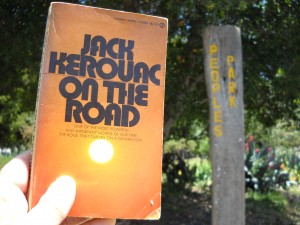
People’s Park
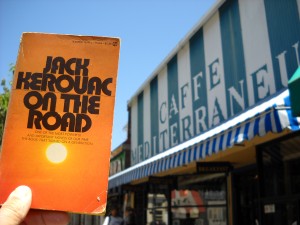
Legendary Berekely cafe
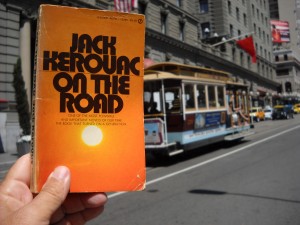
Do the Beatnik fans going to San Francisco overlook Berkeley?
After the New Downtown Berkeley Launch Event was concluded on Tuesday, April 3, 2012, a reporter from KGO radio in San Francisco was walking on Adeline Street with John Caner, the Executive Director of the Downtown Berkeley Association (DBA), when one of the homeless people in front of John’s Ice Cream challenged her to talk to him and get both sides of the story. She declined the invitation to get a balanced picture of the situation and scampered quickly to her Mercedes Benz and drove off informing him that she had all the information she needed.
In the current issue of the East Bay Express (April 4 – 10, 2012) on page 12 of the hardcopy edition, reporter Robert Gammon recaps the skepticism that Joe Debro faced when he criticized the deal which was utilized to bring the Oakland Raiders back to Oakland from their temporary rebel encampment in the Los Angeles area. Debro was vastly outnumbered by sports fans, journalists and politicians who heartily endorsed the efforts to lure the absent rascals back to the Bay Area.
Debro’s objections seem more credible now that the city is in financial crisis mode and the football team might need to be reminded of the particulars of a loan that was instrumental in getting them to (like the prodigal son) return home because it is Debro’s continued position that no payments on the loan have been made and none are scheduled to be made. If families can live paycheck to paycheck, can’t a $53.9 million dollar loan be forgotten if a team is living from season to season?
Time magazine’s Reagan era White House correspondent, Doug Brew, advised reporters to take the time to listen to what people were trying to tell them and not prejudge the quality of their information based on their appearances or apparent financial status. How (you might ask) could the World’s Laziest Journalist possibly be the recipient of advice from such a highly qualified source for opinions on the art of Journalism? We were coworkers on the staff of the weekly Santa Monica Independent Journal Newspapers in the Los Angeles area. That brings up the question: “How well did you get to know him?” When he was welcomed into this columnist’s humble abode in Marina del Rey, Brew expostulated: “My God, Bob, this is a hovel!”
Could KGO’s gal reporter have possibly missed a good Berkeley sidebar story in her haste to get . . . some place else?
On Tuesday afternoon, we were informed by some of the folks in People’s Park that (irony alert!) the beloved guy known as “hate man” had been issued a stay-a-way order from the public park that he calls “home.”
The ten years that Mark Hawthorne (AKA Hate man) worked for the Metro Section of the New York Times were also known as “the Sixties” and we would pay good money to hear him tell his stories and just maybe get some advice on how to produce quality journalism. Hawthorne’s suggestions would probably be just as good as those provided by the fellow who worked for Time magazine.
If UCB’s school of Journalism can’t get hate man to teach there, perhaps they could get Hawthorne to do one guest lecture per semester? Hate man prefers to be outdoors and it is not unprecedented for some UCB classes to be held outside (like perhaps at People’s Park?).
How is that fair and balance act working out for Rupert Murdoch? Maybe if we learned how to do Journalism Fox style, we could wind up driving a Mercedes Benz? Don’t they always put their best sly digs in the form of a question?
Is it true that Rupert Murdoch is trying to buy a major league baseball team and get the town fathers in Foxboro Massachusetts to build a stadium to serve as home for such an enterprise? Could they call such a stadium “The Hen House”?
Could anyone convince the Los Angeles Board of Supervisors to build a brand new football stadium on county owned land in Marina del Rey and let a football team move in for little or no rent? Isn’t Los Angeles the biggest metropolitan area without a major football team? Shouldn’t the board be happy to build a stadium and make loans that can then sit abandoned? Where are the Brookly Dodgers Football team playing these days?
Whatever happened to the pro football teams that used to play in the Los Angeles area?
Is there a C&W song titled “You’ve got a cash register heart”? If not; why not?
Isn’t the University of California Berkeley renovating their football stadium? Aren’t college football games always played on Saturdays and aren’t pro football games always played on Sundays?
If the Berkeley Downtown Business Association really wants to bring shoppers and travelers to their town, why don’t they float a bond issue, take over management of the UCB football stadium and give the Raiders a better deal than a loan that doesn’t have to be paid back? They could pay the Raiders gigantic bonus to move a few miles north and become the Berkeley Raiders!
If Monterey can be world famous as the town where one writer (John Steinbeck) use to live and if Key West Florida can hold an annual Hemingway Days series of events because just one writer used to live in their community, then why don’t book readers from all over the world flock to Berkeley where Ursula K. LeGuinn was born, and Philip K. Dick, Alan Ginsberg, and Jack Kerouac used to live?
Since the Mediterraneum was open when Dick, Ginsberg, and Kerouac all lived in Berkeley, isn’t it natural to wonder if they ever had a brief chat there?
Charles Dickens, when he came to the United States to visit, made a particular point of going to visit Lowell Massachusetts because of its literary heritage because a famous magazine had been published there. That was years before Jack Kerouac’s father brought his family to that town. Isn’t the Berkeley Barb mentioned repeatedly in “Smoking Typewriters,” which is about the history of underground newspapers in the USA?
Last fall, when the high school finalists in the freedom of speech essay contest read their winning entries didn’t it get coverage on the TV networks by holding the event on the Mario Savio steps at the Sproul Plaza area of UCB?
Doesn’t the guy who runs the Daily Kos website for liberal online commentary live in Berkeley?
Is there a DBA suggestion box for ways to bring attention to Berkeley?
If the Journalism students at UCB were to produce a TV show all about Berkeley every day, wouldn’t it be quite likely that in this era of “low cost is no cost” broadcasting if they offered such a product to a cable TV company gratis, they would take it and offer it to viewers all over the world? (Fox seems to be ubiquitous in Australia. Lottsa sports.) Wouldn’t that be a career boost for the participating students and wouldn’t that win the DBA seal of approval?
Doesn’t Kalgoorlie, in Western Australia, lure visitors from all over the world with just one word? Gold! How far from Berkeley is Sutter’s Mill?
[Note: It was a challenge to find a way to illustrate this column. We used material from an abandoned photo project titled “On the road with a copy of ‘On the Road.’” Since Berkeley is specifically mentioned in “The Dharma Bums,” that might have been a better choice, but the photo editor had to go with what was available.]
National columnists’ Day is rapidly approaching and the World’s Laziest Journalist intends to write a column for the occasion about a fellow who was born in Berkeley (about a hundred years ago) and became one of the Bay Area’s top contenders for the right to call himself “Mr. San Francisco.” UCB has the Hearst School of Journalism and that particular Berkeley rascal was personally fired by William Randolph Hearst . . . twice. That notorious columnist might provide the basis for one installment of the aforementioned hypothetical student TV show “Berkeley Tonight” (or whatever).
Didn’t the Sixties officially start (in Berkeley) when Mario Savio said: “There’s a time when the operation of the machine becomes so odious—makes you so sick at heart—that you can’t take part. You can’t even passively take part. And you’ve got to put your bodies upon the gears and upon the wheels, upon the levers, upon all the apparatus, and you’ve got to make it stop. And you’ve got to indicate to the people who run it, to the people who own it that unless you’re free, the machine will be prevented from working at all.” [Can you believe that that quote is not in Bartlett’s?]
Now the disk jockey will play Janice Joplin’s “Oh, dear Lord,” Ry Cooder’s “Crazy ‘Bout an Automobile (Every Woman I Know),” and Woody Gutheris’s “Go For a Ride in the Car, car.” Speaking of cars, we have to celebrate this weekend by watching “Rebel without a Cause” one more time. Have a “See the USA in your Chevrolet” type week.
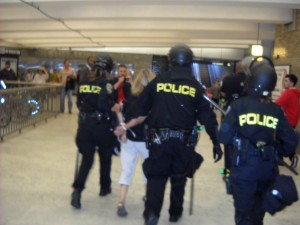
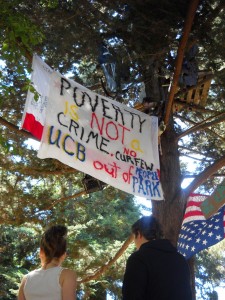
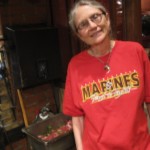
Berkeley looks back
Approximately 50 years ago, a traffic ticket was issued and put on a car being operated by a member of the University of Scranton Class of 1965. The fellow came along as the ticket was being written and he tried to talk his way out of it. Other students passing by stopped to watch. A crowd partial to the plight of the student gathered and thing began to reel out of control. More police arrived and then a round-up of students started. Later in the afternoon, a local radio station reported that 18 arrests had been made. The chancellor of the Jesuit University went down to the local police station and by the time the local morning newspaper was delivered the next day, no arrests had been made and no incident had occurred. Unless someone had been there to see it happen, most Scrantonians would ever know about it. The incident was quickly forgotten and (mostly) disappeared from the annals of Scranton History.
On October 1, 1965, a student at the University of California’s Berkeley campus, Jack Weinberg, was proselytizing from a card table on Sproul Plaza about the Congress of Racial Equality (CORE). The topic was in direct conflict with school rules which expressly forbade political oriented activity on the campus where a scholarly atmosphere was traditional. Again, events spun out of control and eventually students surrounded the police car where the fellow who was being arrested was sitting. Someone urged the students to lie down all around the police car to deter the car from proceeding to the police department. A stand-off situation developed.
One student, Mario Savio, in an attempt to defuse the volatile situation, jumped on top of the police car (he removed his shoes so that he wouldn’t scuff the paint) and began to give a speech. That example of impulsive extemporaneous oratory became an iconic moment and would be recognized around the world as the start of the student activism era in the USA and Berkeley’s Free Speech Movement (FSM).
A rally to mark the fiftieth anniversary of the events which spawned the Free Speech Movement was held Wednesday, October 2, 2014, at the same location, Sproul Plaza, and drew a crowd of several hundred which included current students and (by a show of hands) a goodly number of individuals who had witnessed the original confrontation.
It was a melodramatic moment for them when the voice of Mario Savio was replayed via electronic means. Cynics who appreciate heavy-handed audience manipulation couldn’t help but notice that it would have reduced the older folks to tears if the event producers had played Jerry Lee Lewis’ song “I wish I was 18 again.”
An assortment of journalists was on hand to record the new event for posterity. Local newspaper and radio news reporters were there as well as a platoon of photographers and at least two TV news crews.
One of the reporters was representing the Paris publication Le Monde newspaper and the reporter, Cerine Lesnes, mentioned that she was new to the area. She had been reassigned to the Bay Area because that paper had just opened up a news bureau in San Francisco.
Since newspapers have been cutting the use of satellite offices as a cost cutting measure, this bit of trade talk caused us to schedule a bit of subsequent fact checking to see if this is an anomaly or if it can be used to write a future trend-spotting column about a turnaround in the newspaper industry.
Ironically the ceremony to mark the fiftieth anniversary of the start of the Free Speech Movement fell on the same day that the new issue (Vol. 49, No. 1) of the Bay Guardian carried the latest installment of Project Censored’s annual list of the year’s top ten underreported stories. Free Speech is about the unimpeded flow of information; contemporary Mainstream Media (MSM) is about corporate propaganda masquerading as news.
Fifty years ago students clamored to have their voices heard on social issues, but in the interim, the main stream media in the United States has become a sad pathetic echo of what the citizens think they are getting; i.e. enough information to make well informed decisions in the voting booth.
We explained briefly to the Le Monde reporter, why there would never again be student anti-war protests in the United States (and Berkeley in particular). The cost of tuition has priced many Americans out of the market for a top notch university education. They have been replaced by students from wealthy foreign families who don’t care what the USA does, the wealthy Americans who are training to take their place as the community leaders of the future (and not about to rock the boat) and kids who are signing up for a life of indentured servitude via student loans. The student loan contingent can be stripped of their academic standing if they get arrested in a demonstration but they would still have the loan to repay, hence they operate on the “ya gotta go along to get along” principle. (Google hint: to learn more about how the Frisco area looks to a reporter from Paris: twitter dot com slash BicPictureCL)
The irony of celebrating free speech while economic reality stifles dissent and student criticism in political issues seems to contradict the essence of what the day was meant to promote.
Many Americans think that the valuable role played by newspapers has been supplanted by the Internets but reality contradicts the idea that “you can look it up on the Internets.”
Last week, we did some fact checking on the Internets and concluded that the New York Times’ Maureen Dowd had fumbled a great opportunity to gather material for a top notch column. Subsequently we learned that she had written what may be her best column ever with a lead sentence which may get her into future editions of “Bartlett’s Familiar Quotations.” In her column for September 20, 2014, she opened with this sentence: “WHEN Willie Nelson invites you to get high with him on his bus, you go.” (Odds are that even the Pope would concur.)
There are times when the World’s Laziest Journalist wants to check something we have written in the past and our attempts to find it online have been unsuccessful. Our opinion of the quality of the information available on the Internets keeps shrinking.
Initial critical assessments of the Internets potential asserted that it would become just another sales tool for corporate America and that the promise of developing unique voices that could build an audience and clout was doomed to be vetoed by the corporate leaders who will be very reluctant to foster any means that would encourage and supply an opposing point of view.
At first glance, the UCB event Wednesday was a chance to cover (and run) a light-hearted look laden with nostalgia back at some Sixties lore. A closer examination of the changes that have occurred in the last fifty years would require a bit more than a quick column geared to please in the skim and click age.
The Congress on Racial Equality isn’t in the news much lately but if you look around on the internets you will find that the assertion that a person of African-American heritage is shot by a police agency (on the average) of once every twenty eight hours is ubiquitous.
Fifty years ago, 18 year old young men were being drafted to fight in conflicts started by politicians whom the draftees couldn’t vote for until three years later. Now new military action can be sanctioned by a budget vote held late at night. The all volunteer military is staffed by young folks who can’t afford to go to college and don’t want to be burdened by student loans.
Corporations are still reaping large tax benefits from Prop 13. The loss of property tax revenue has meant that tuition costs in California have become astronomical (metaphorically speaking) and so the people struggling with student loans are probably not thrilled about the fact that corporations are still reaping benefits from that decades old bit of legislation.
Have things changed via the Free Speech Movement or is it a case of the more things seem to change the more the reality is “same ole, same ole”?
The words of Mario Savio will be quoted extensively in various “Week in Review” round-ups and so, to be different, we’ll quote Andy Gowdy who once said to Chef Teddy Owens: “For your birthday, we’ll take you up to Vegas and get you some new scars.”
The disk jockey was tasked with finding songs about being arrested, so he will play
Johnny Cash’s “Live at Folsom Prison” album, and Merle Haggard’s “Mamma tried” and Toby Keith’s “I’ll never smoke weed with Willie again.” We have to go post bail for a buddy. Have a “‘get out of jail free’card” type week.